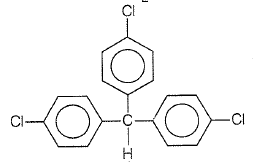The compound formed when malonic acid heated with urea, is
1. cinnamic acid
2. butyric acid
3. barbituric acid
4. crotonic acid
Trichloroacetaldehyde, CCl3CHO reacts with chlorobenzene in the presence of sulphuric acid and produces
| 1. |  |
| 2. |  |
| 3. |  |
| 4. |  |
1. 
2. 
3. 
4. 
What compound results from the catalytic dehydrogenation of a primary alcohol?
1. Aldehyde
2. Ketone
3. Alkene
4. Acid
The compound which on reduction with gives two diffrent alcohols:
1.
2.
3.
4.
HCHO and HCOOH are distinguished by treating with:
1. Tollens reagent
2. NaHCO3
3. Fehling's Solution
4. Benedict Solution
Lacrymator or tear gas is:
1. C6H5COCl
2. C6H5OC6H5
3. C6H5COCH2Cl
4. C6H5COCH3
Formaldehyde can be distinguished from acetaldehyde by:
1. Fehling's solution
2. Schiff's reagent
3. Ammonia
4. Ammoniacal
The correct acidity order of the following is:


1. (III)>(IV)>(II)>(I)
2. (IV)>(III)>(I)>(II)
3. (III)>(II)>(I)>(IV)
4. (II)>(III)>(IV)>(I)
Acetone reacts with iodine (I2) to form iodoform in the presence of
1. CaCO3
2. NaOH
3. KOH
4. MgCO3
Generally Aldehydes behave as:
1. Oxidising agent
2. Reducing agent
3. Dehydration agent
4. Oxidizing as well as reducing agent






